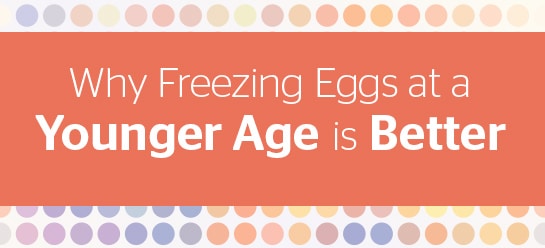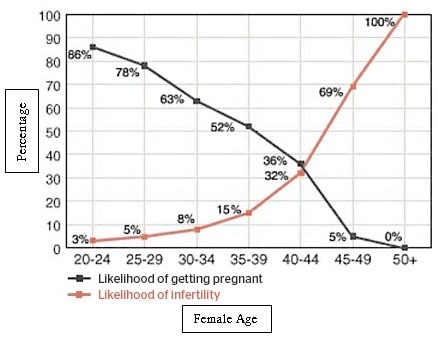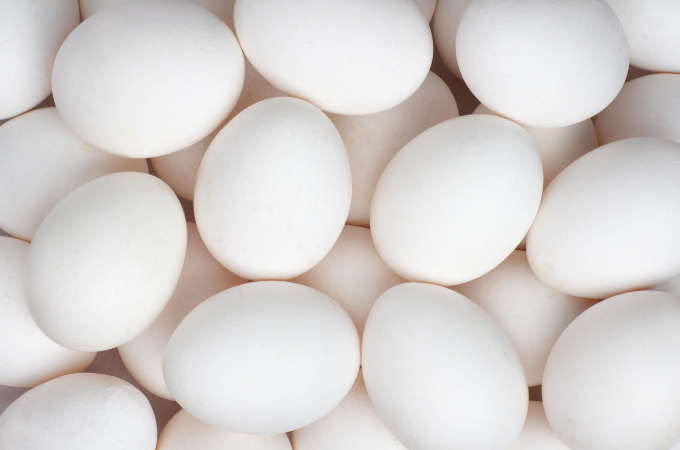
The ticking of the biological clock is a familiar phrase to every woman, and it looms large for some because of what it represents: the decreasing ability to achieve a pregnancy as we move into our middle 30s and 40s. This decline is natural. It is the normal byproduct of fluctuating reproductive hormone levels, which are central to the development of both egg quantity and quality. These changes are often subtle, misleading women to believe their chances of achieving a pregnancy are the same at every age. The very good news for women is that freezing eggs – also known oocyte cryopreservation – is a viable option to stop the biological clock and preserve fertility potential at the age the eggs were frozen.
Is There a Perfect Age to Extend the Biological Clock?
As the chart below indicates, women have a higher chance of conceiving naturally and giving birth to a healthy baby when they attempt to get pregnant before 35. After 35 years, the proportion of women who experience infertility continues to increase, due to diminishing fertility potential. By the age of 40, only two in five of those who wish to have a baby will be able to do so naturally.
Therefore, the best age to freeze eggs is the time when fertility is still relatively high but before it begins to decline more rapidly, as it does in the later 30s and 40s.
At Shady Grove Fertility, women who freeze eggs in their early to mid 30s can generally expect a higher number of quality eggs than those who freeze at an older age. As medical technology improves and women become more educated about the reproductive processes that drive fertility, they are freezing eggs earlier. At Shady Grove Fertility, for example, the average age of women seeking treatment decreased from 38 to 36 in the last two years.
The chart below shows chances of getting pregnant by age. The chart is only a guide. It shows average figures for women in the best of health.

Freezing Eggs – How Many Eggs Should I Freeze?
Ideally, freezing 15-20 eggs is recommended because it would optimize the chances of achieving one or two pregnancies later on. Pregnancy success rates with frozen eggs are directly correlated to the age at which the eggs were frozen. Frozen eggs mimic nature’s natural patterns, meaning the frozen eggs of a 34-year-old are more likely to fertilize, implant, and result in a baby than those of a woman in her 40s. This means fewer eggs will be required to achieve a pregnancy. At Shady Grove Fertility, we will freeze eggs for women up to the age of 40, depending on the ovarian reserve testing results.
Ovarian reserve is a term used when discussing the ability of the ovary to produce good quality eggs. Ovarian reserve testing is performed on the third day of the menstrual cycle and consists of blood tests to evaluate reproductive hormone levels and an ultrasound to see how many follicles (sacs containing eggs) exist in the ovaries. The tests are simple, painless, and can be completed in one office visit. Read more about the testing required for egg freezing.
What Are the Chances of Having a Baby When Using Frozen Eggs?
Technology advances have nearly eliminated the differences in IVF success rates using fresh and frozen eggs. This means a 40-year-old woman using her own eggs, which were frozen when she was 35, can expect a comparable chance of delivering a baby as a 35-year-old woman going through IVF using fresh eggs.
Interestingly, the quality and quantity of a woman’s eggs are more sensitive to time than her uterus, which is why pregnancy can be attempted up until age 51. According to Shady Grove Fertility’s Gilbert Mottla, M.D., “the uterus is a muscle and is essentially ageless when compared to egg cells. Uterine muscle cells are renewed as are other cells in the body and benefit from good nutrition and lifestyle.”
Freezing eggs creates an option for women who don’t see motherhood in their near future and are concerned with the decline of their fertility, whether related to age or other known factors such as premature ovarian failure, early menopause, or upcoming cancer treatment. For some, freezing eggs is seen as “plan B” and the hope is that they are able to get pregnant naturally. Therefore, not all women will use their frozen eggs.

Take Steps Toward Preserving Your Fertility
- Read as much as you can about the procedure.
- Talk to a trusted friend or family member.
- Read our FAQ’s.
- Recognize you are not alone – more and more women are choosing to freezing their eggs.
- Talk to someone who has frozen her eggs by emailing [email protected].
- Attend SGF’s online seminar about Egg Freezing. Register here.
- Schedule your ovarian testing and consultation by filling out this form or by calling (877) 411-9292.
If you are are considering freezing your eggs, it may be time schedule an appointment at Shady Grove Fertility, please speak with one of our New Patient Liaisons at 877-411-9292





